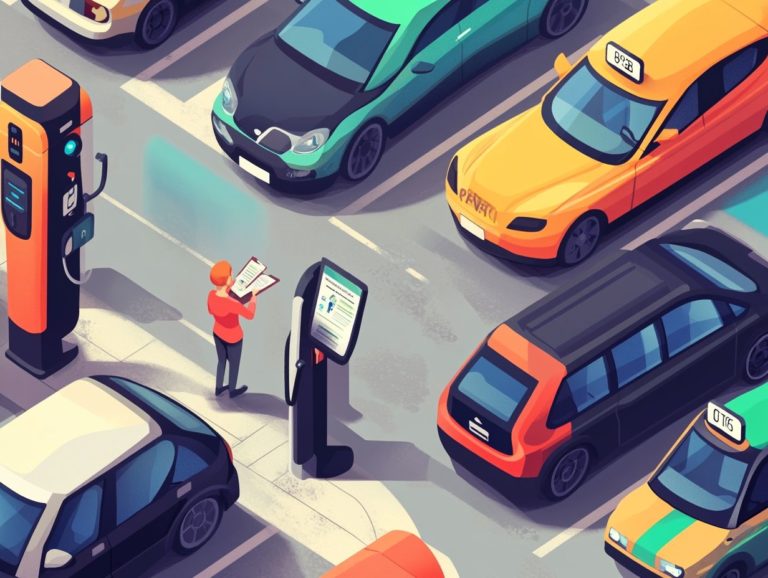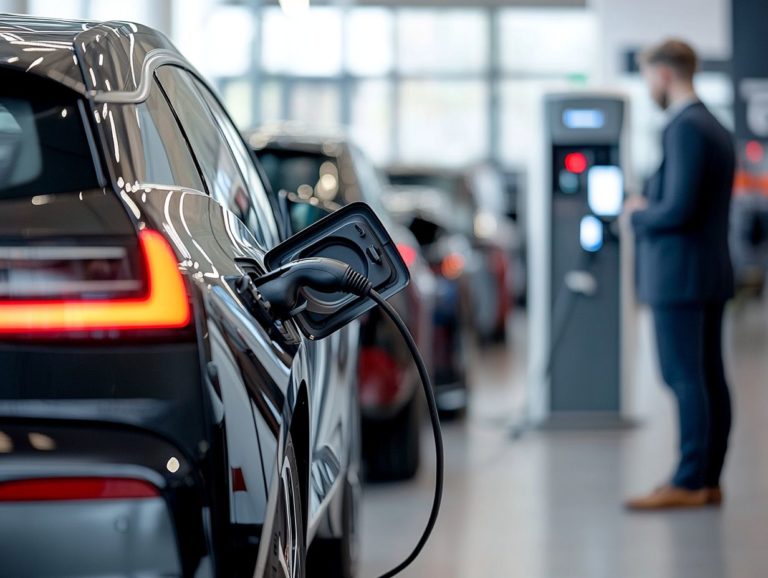5 Things Every EV Buyer Should Know
As electric vehicles (EVs) gain momentum in the automotive world, you may find yourself wading through a vast ocean of information and options. Diving into the world of EVs can be thrilling!
This article presents a clear breakdown of what it means to own an EV. We cover everything from the various types available and their charging capabilities to the costs associated and the tax incentives at your disposal.
It also addresses common misconceptions, examines the environmental impacts, and outlines maintenance requirements. This will guide you in determining whether an EV aligns with your needs.
Let s unveil the essential insights every prospective EV buyer should be well-acquainted with!
Contents
- Key Takeaways:
- 1. The Different Types of Electric Vehicles
- 2. The Range and Charging Capabilities of EVs
- 3. The Cost of Owning an EV
- 4. Tax Incentives and Rebates for EV Buyers
- 5. The Availability of Charging Stations
- What Are the Benefits of Owning an Electric Vehicle?
- Frequently Asked Questions
- What are the top 5 things every EV buyer should know?
- How can I ensure I have access to convenient charging options as an EV buyer?
- What factors should I consider when choosing an EV model?
- Are there any drawbacks to owning an EV?
- Can I still take road trips with an EV?
- Are there any environmental benefits to owning an EV?
Key Takeaways:
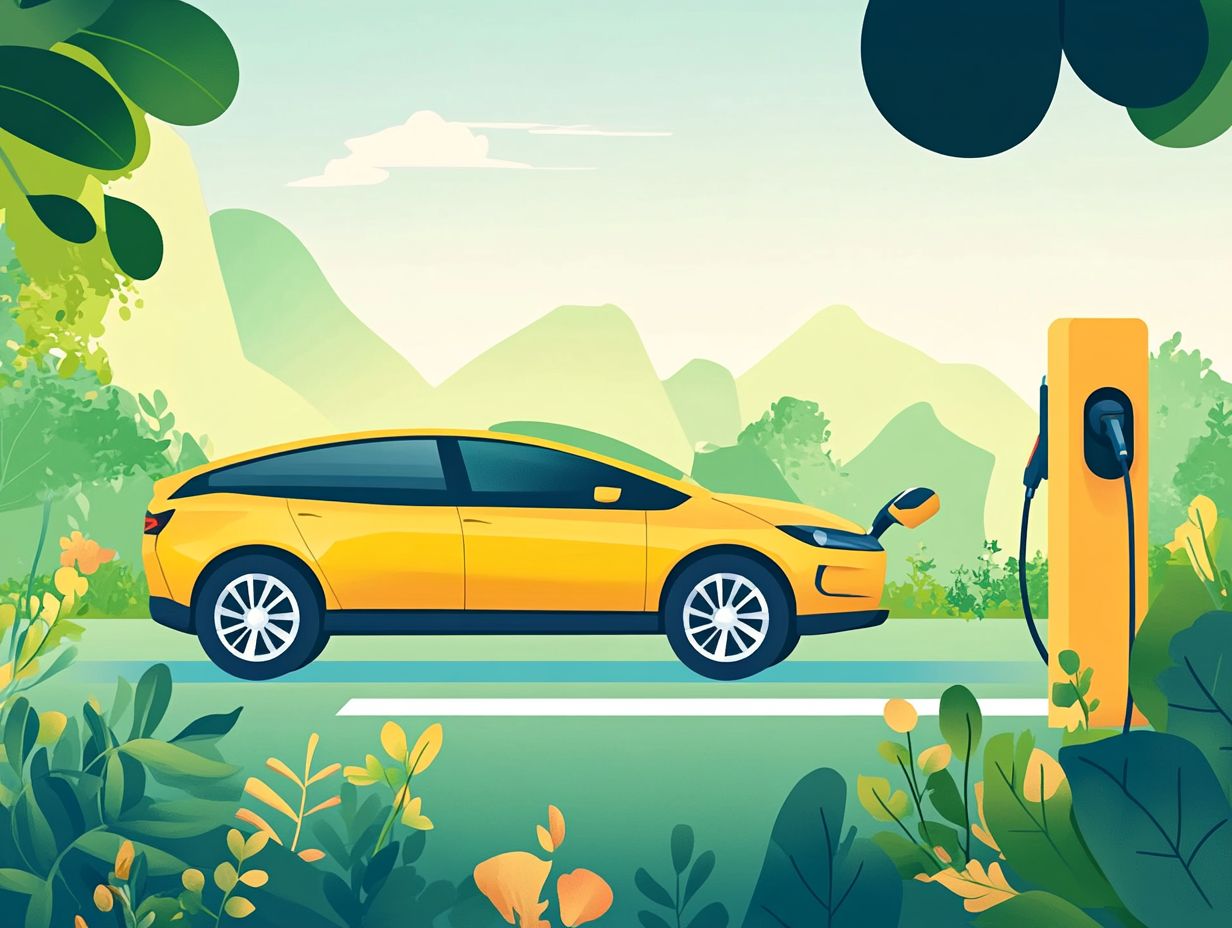
- Know the different types of EVs available in the market to make an informed decision.
- Consider the range and charging capabilities of EVs to plan for longer trips and avoid range anxiety.
- Understand the cost of owning an EV, including potential savings on fuel and maintenance costs.
1. The Different Types of Electric Vehicles
The electric vehicle (EV) market is expanding rapidly, presenting you with a diverse array of options. These include Battery Electric Vehicles (BEVs) and Plug-in Hybrid Electric Vehicles (PHEVs). Each type is designed to match your unique driving habits and preferences.
With popular models like the Tesla Model 3, Chevy Bolt, and Nissan Leaf, you can select a vehicle based on what matters most to you whether it’s driving range, purchase price, or battery health.
BEVs, such as the Ford Mustang Mach-E and Volkswagen ID.4, operate solely on electric power and typically offer longer ranges. These options are perfect for those who prioritize sustainability and wish to lessen their carbon footprint.
PHEVs like the Toyota Prius Prime and Mitsubishi Outlander blend gasoline engines with electric power. This provides the flexibility you might need for longer trips without the stress of range anxiety.
While BEVs generally require less maintenance and have lower operating costs thanks to fewer moving parts, PHEVs can be appealing if you still appreciate the convenience of traditional fueling options. Remember that considerations like battery life can differ significantly.
BEVs often come equipped with cutting-edge battery technologies, while PHEVs strive to balance both power sources to maximize efficiency and reduce environmental impact.
2. The Range and Charging Capabilities of EVs
Range anxiety continues to be a major concern for those considering electric vehicles. Thanks to advancements in charging capabilities and driving range, your fears are being alleviated making EVs more accessible than ever!
You have choices, from fast-charging stations to convenient home charging setups, all tailored to fit your driving habits. To truly grasp the driving range, consider factors such as battery health, vehicle weight, and aerodynamics.
These elements can significantly influence how far your electric vehicle can travel on a single charge. The type and quality of driving features like regenerative braking (which helps recharge the battery while slowing down) and efficient climate control are crucial in optimizing that range.
Local charging options also play a pivotal role in your electric vehicle experience. The surge in fast-charging stations is a testament to an expanding infrastructure. This not only minimizes downtime but also boosts your confidence in long-distance travel.
This development ultimately supports the growing viability of electric vehicles as a mainstream choice for everyone. Don’t miss out on the future of driving!
3. The Cost of Owning an EV
The cost of owning an electric vehicle (EV) extends beyond just the purchase price. It also includes ongoing expenses like maintenance and fuel savings, all of which shape your overall ownership experience.
While new models may come with a higher upfront cost, opting for used vehicles can yield significant savings. This is particularly true when you factor in the long-term financial benefits.
Understanding the total cost of ownership is essential for you as a potential buyer. New EVs boast the latest technology and warranties that may alleviate some maintenance concerns. For those considering their options, referring to the ultimate checklist for EV buyers can be particularly helpful. On the other hand, used models often present a more budget-friendly choice for those who prefer to be cautious about initial expenditures.
The financial advantages also stem from reduced fuel prices and enticing tax incentives. These factors enhance the appeal of both new and used electric vehicles. Keep an eye out for promotions or seasonal discounts that could sway your decision toward a more eco-friendly option!
4. Tax Incentives and Rebates for EV Buyers

Tax incentives and rebates are pivotal in making electric vehicles more accessible to you. They encourage the exploration of available financial incentives like tax credits and rebates that can significantly reduce your purchase price. These incentives make owning an EV even more appealing!
In many regions, federal tax credits can lead to substantial savings for you, often exceeding $7,500 depending on the vehicle’s battery capacity. Some states also offer additional rebates, ranging from a few hundred to several thousand dollars, further cutting down the overall cost of the vehicle.
Take California and New York, for example; they’ve rolled out specific programs designed to promote electric vehicle adoption. These incentives not only lighten the initial financial load but also contribute to a notable market trend. More consumers like you are increasingly viewing electric vehicles as a viable alternative to traditional gasoline-powered cars, reshaping the entire automotive landscape.
5. The Availability of Charging Stations
The availability of charging stations plays a crucial role in your experience as an EV owner. Convenient access to local charging options, particularly fast charging facilities, enhances your driving experience and alleviates any range anxiety you might feel.
With an increasing number of EVSE installations, you can take comfort in knowing that reliable charging solutions are always within reach. This trend is reflected in the impressive growth of charging infrastructure, with reports revealing that the number of public charging stations in the United States has surged by over 40% in just the past year.
Local charging options not only make longer journeys more feasible but also encourage you to invest in electric vehicles. While the installation costs can be substantial, the long-term benefits of fast charging stations like reduced wait times and enhanced convenience far outweigh the initial expenses.
Act now to take advantage of the growing network of charging options! With faster charging capabilities, more drivers are likely to be drawn to EVs, potentially doubling the market’s growth in the coming years.
What Are the Benefits of Owning an Electric Vehicle?
Owning an electric vehicle (EV) opens the door to numerous benefits, from significant fuel cost savings to enhanced energy efficiency and a reduced environmental footprint. However, it’s important to be aware of the top 7 mistakes to avoid when buying an EV, as these advantages elevate your driving experience and align perfectly with the preferences of today’s discerning consumers.
As the EV community expands, the perks of making the switch to electric become even more pronounced. This vibrant community offers invaluable resources for new owners and fosters a sense of belonging, enriched by shared experiences and support.
You ll appreciate lower maintenance costs thanks to fewer moving parts while actively participating in a movement that champions sustainability. Features like regenerative braking and advanced navigation systems enhance your overall satisfaction, ensuring that every journey is both enjoyable and eco-friendly.
With charging stations becoming increasingly convenient, embracing electric mobility is easier than ever. Join the growing ranks of environmentally-conscious drivers and explore your options today!
What Are the Common Misconceptions About EVs?
Despite their rising popularity, several misconceptions surround electric vehicles (EVs). To clear up these concerns about driving range, battery health, and maintenance costs, it’s helpful to understand how to prepare for your first EV purchase.
Many believe electric vehicles can t cover long distances without needing a recharge. However, recent data shows that today s EVs often surpass 250 miles on a single charge, comfortably accommodating most daily commutes.
Advancements in power sources are improving longevity and resilience. Many EV manufacturers offer warranties that last eight years or more, giving you peace of mind on the road.
Studies show that EVs can save you significantly on fuel and maintenance compared to traditional gasoline vehicles. This compelling argument makes a strong case for switching to electric.
What Are the Environmental Impacts of Owning an EV?
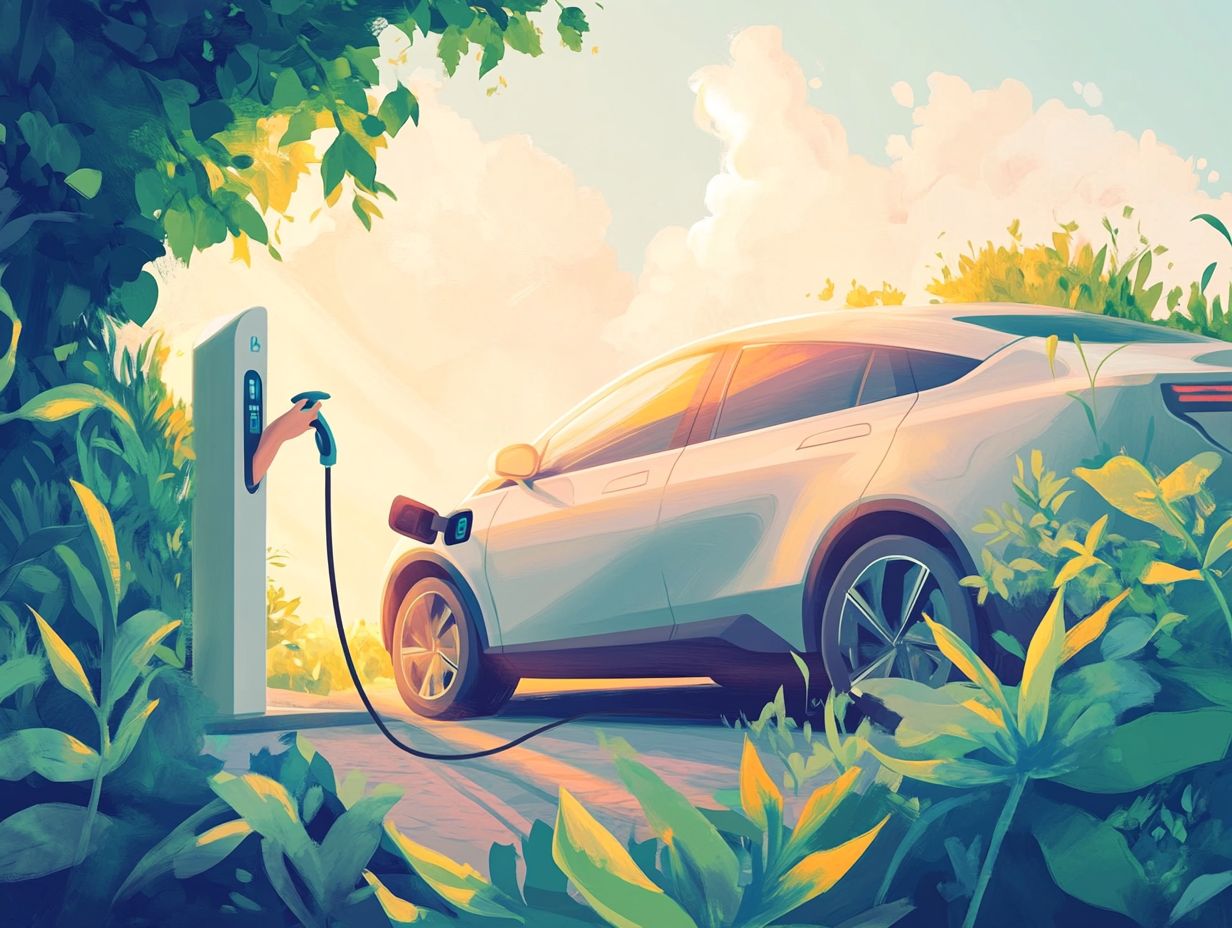
The environmental impact of owning an electric vehicle (EV) is one of its standout benefits. Reduced emissions and enhanced energy efficiency play crucial roles in combating climate change.
While transitioning to electric mobility can significantly reduce greenhouse gas emissions when in use, consider the entire lifecycle of the vehicle. This includes the environmental costs of extracting and processing materials for the batteries.
The sources of electricity powering your EV matter too. If they come from fossil fuels, the advantages may be less significant. By understanding these complexities, you can make choices that positively impact both your local environment and the planet.
What Are the Maintenance Requirements for EVs?
Electric vehicles (EVs) have different maintenance needs compared to traditional vehicles. Emphasis is placed on battery health, vehicle maintenance, and warranty coverage.
Regular battery checks are crucial to prevent unexpected performance issues since the battery is the heart of your EV. Staying informed about software updates enhances your vehicle’s performance and safety features.
Don’t overlook tire maintenance; proper tire pressure and tread depth significantly affect your vehicle’s efficiency. Be aware that warranty coverage for EVs has unique terms compared to conventional vehicles, focusing mainly on the battery and electric components.
How Can One Determine If an EV Is Right for Them?
Deciding if an electric vehicle (EV) is right for you starts with understanding your driving habits and how far you usually drive. As you weigh your options, consider avoiding certain features in an EV by checking the top 5 features to avoid. Think about whether you want a new model or a used one.
As you consider these factors, reflect on your weekly travel patterns and how often you take longer journeys. If most of your trips are short, an EV could effortlessly complement your routine. However, if extensive road trips are your norm, you’ll need to factor in additional charging needs.
The choice between new and used models brings its own set of variables, including warranty advantages, technological innovations, and budget constraints. It’s important to evaluate not just the immediate financial implications, but also the long-term savings, such as reduced maintenance costs and improved fuel efficiency. This approach empowers you to make a well-informed decision that truly aligns with your driving lifestyle.
What Are the Future Prospects of EVs in the Automotive Industry?
Get ready for an exciting future with electric vehicles (EVs)! The surge in EV sales and evolving market trends point towards a significant shift towards sustainable transportation. As you adapt your consumer strategy to embrace these changes, the potential for growth and innovation in the EV market is unprecedented.
This transformative landscape is fueled by growing awareness of environmental issues and substantial advancements in battery technology and charging infrastructure. As more manufacturers enter the market, competitive pricing and improved vehicle range have become standard expectations for you as a consumer.
Key players in the industry ranging from established automotive giants to innovative startups are pouring resources into research and development. They’re enhancing features like self-driving capabilities and interconnected smart technology to elevate your driving experience.
Through these efforts, the industry is not merely reacting to environmental concerns; it is actively reshaping how you think about driving, making electric vehicles an enticing option for a broader audience.
Frequently Asked Questions
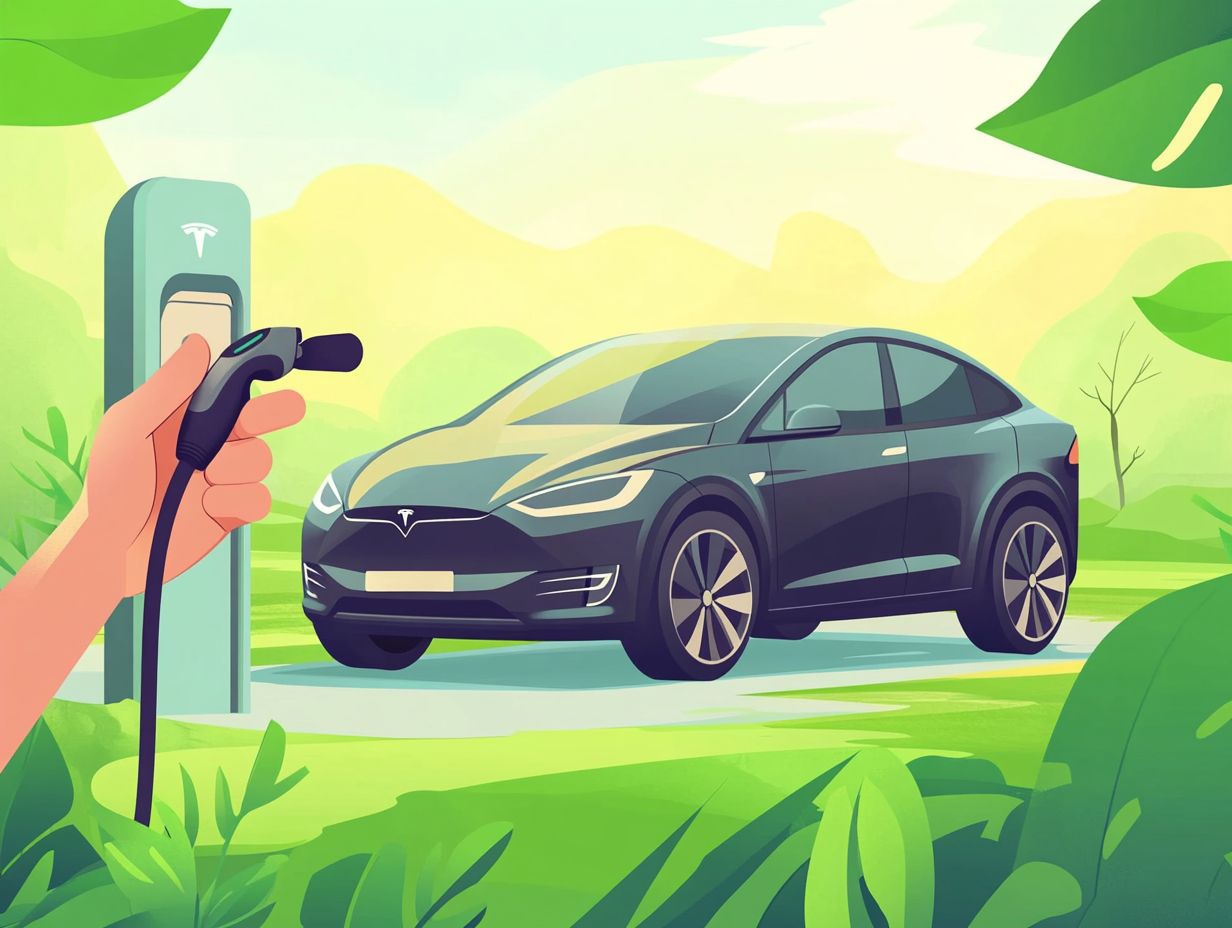
What are the top 5 things every EV buyer should know?
1. Range: Understanding the range of an EV is crucial when making a buying decision. Research the average range of different models and consider your daily driving habits. For more insights, check out the top 5 misconceptions about buying an EV.
2. Charging Options: EVs can be charged at home, public charging stations, or through fast charging. Knowing the options available can help you plan for convenient and efficient charging.
3. Incentives and Tax Credits: Many countries and states offer incentives and tax credits for purchasing an EV. Look into these opportunities to save money on your purchase.
4. Maintenance: EVs have fewer moving parts compared to traditional gasoline cars, resulting in lower maintenance costs. However, it’s important to understand the specific maintenance requirements and costs for EVs.
5. Total Cost of Ownership: While EVs may have a higher sticker price, they can save you money in the long run due to lower fuel and maintenance costs. To make an informed decision, learn how to avoid common EV buying pitfalls and consider the total cost of ownership when comparing EVs to traditional cars.
How can I ensure I have access to convenient charging options as an EV buyer?
There are various resources available online to help you find charging stations in your area. You can also reach out to your local government or utility company to inquire about charging infrastructure plans for your community.
What factors should I consider when choosing an EV model?
In addition to range and charging options, consider the size and type of vehicle that best fits your needs. EVs come in various models, including sedans, SUVs, and even trucks. Research the battery capacity and technology used in different models.
Have more questions? Reach out for personalized guidance on choosing your EV!
Are there any drawbacks to owning an EV?
Owning an EV has great benefits, but it also has some drawbacks. You might face longer charging times, a limited range for certain models, and higher upfront costs. To learn more, check out these 5 things you didn’t know about electric cars.
Technology is getting better all the time, which helps to improve these issues.
Can I still take road trips with an EV?
Yes, you can take road trips with an EV! Just plan ahead to find charging stations along your route.
Be ready for longer stops to allow for charging. Having a backup plan is smart, in case a charging station is out of service or too busy.
Are there any environmental benefits to owning an EV?
Absolutely! EVs produce zero emissions, making them much friendlier to the environment than traditional gas cars.
They help reduce air and noise pollution, leading to a cleaner and quieter environment.



